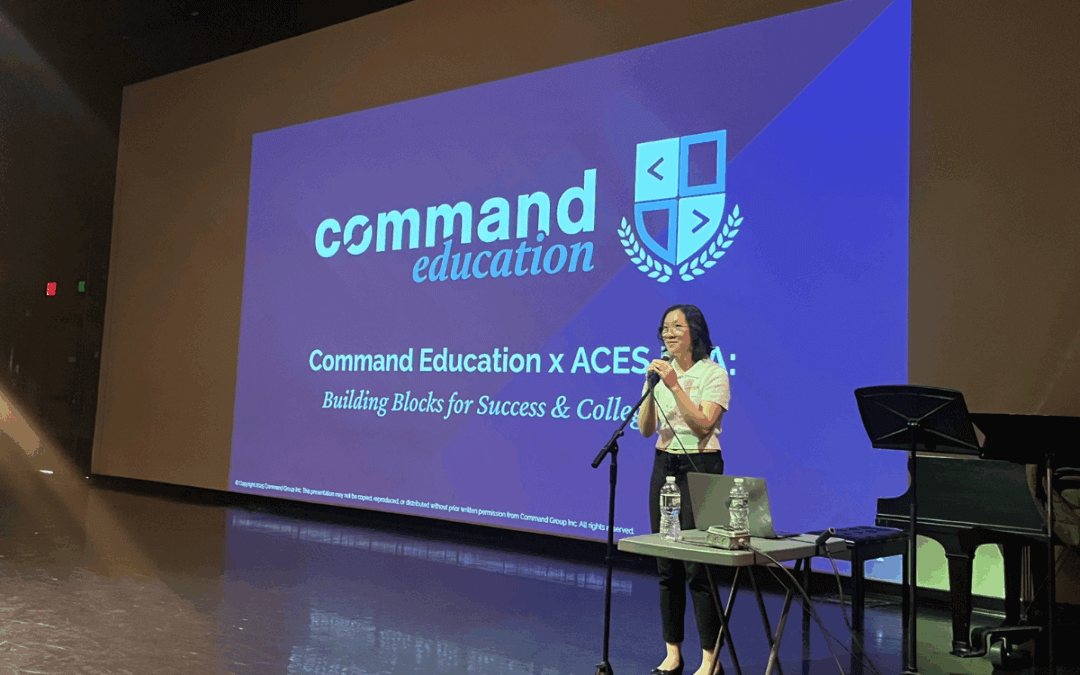For many students, an acceptance letter from their dream school seems like the destination—it represents the culmination of years of hard work, planning, and preparation. But an acceptance is really just the beginning of a student’s college journey. With this exciting new season of life comes new challenges, as students must learn to navigate the world independently, excel in and outside of the classroom at their new institution, lay the foundation for their future career, and develop the skills and abilities needed to become autonomous adults.
For many students, the transition to college can present just as many challenges and stresses as the college admissions process itself—which is why consistent, one-on-one mentorship is just as important in this stage of life, too. At Command Education, our Senior Mentors don’t just empower students to get into their dream schools; they equip them to excel once on campus. Our College Success Package provides students with personalized support that empowers them to establish a strong foundation for their collegiate career and beyond. From discovering and articulating their passions to shaping their academic path, engaging in campus life, and creating impact through leadership and internships, we offer individualized, expert guidance that helps students thrive.
Below, Director of Mentoring Ian provides insights into how our Mentors coach current college students to excel academically, socially, and professionally during these pivotal years.

What are some of the biggest challenges students face once they’re on campus?
Ian: The transition to college brings immediate challenges, from adjusting to a new sense of independence without the structure of living at home to managing new responsibilities and making use of the greater free time of a college schedule. Beyond these, students must also navigate new academic hurdles such as managing coursework, learning to interact with professors (attending office hours, emailing them introductions, etc.), and identifying support networks on campus. Finally, they face challenges related to social life and extracurriculars, such as taking advantage of opportunities on campus, applying for internships, and positioning themselves for fellowships and selective programs. So, without proper guidance, early missteps (i.e. poor class selection, misunderstanding how to approach assignments, overcommitting to activities, or failing to identify the appropriate summer internships/extracurriculars) can result in missed opportunities and a failure to build a strong profile for future professional opportunities or graduate school.

What are some of the most important skills and tasks that students should be engaging in as they begin their college journey?
Ian: The first year of college is arguably the most important—it is the first year of college sets the tone of the next three. The most successful students have a clear roadmap in mind before entering college. This isn’t to say they have to have it all “figured out” before they step foot on campus, but they should have a general idea of which opportunities they want to pursue, which courses they may want to take, and how to build strong relationships with faculty. With these goals in mind, they can take time to explore comfortably without feeling aimless. Even small decisions in college are stepping stones toward internships, graduate programs, and future careers. Recognizing this empowers students to be intentional with their time beginning in their first year.

How do Senior Mentors provide support for students who may be struggling with the transition into college?
Ian: It’s normal for students to eventually face challenges in college—academic, emotional, social, professional obstacles are normal aspects of the adjustment process. As students face these challenges, it’s important that they have the support of someone who has excelled at an elite college and understands firsthand how to navigate the pressures. You can’t get that kind of expertise and personalized support anywhere else. Command Education Senior Mentors help students navigate the challenges they face in college with proven strategies: connecting students to campus resources, helping them network with professors, providing time management support, teaching stress management, and reassuring students as they embark on the “trial and error” phase of their college journey. Parents don’t have to stress over whether their child is thriving on their new campus; instead, they can feel reassured that their student isn’t falling through the cracks.

What role does mentorship play in helping students select extracurriculars and organizations that align with their career goals?
Ian: Senior Mentors help students see the long-term, strategic impact of their involvements and critically evaluate how they want to use their time. This is particularly important—and particularly challenging—in light of how many opportunities are available to students in college. Identifying the best activities to pursue in the midst of so many options can easily become overwhelming. Yet, it is imperative for students to maximize opportunities outside of the classroom in order to build their network, grow as scholars and professionals, and gain hands-on experience in their field. We work with students to choose organizations and roles that will set them up for success later on and open doors for them professionally and academically—whether research with a professor, leadership in a club, community service, summer internships, a part-time job, or membership in a professional society.

My student seems to be thriving at college—could they still benefit from mentorship?
Ian: Definitely! Even students who are doing well often aren’t taking full advantage of what their college offers. A student might be keeping up with their coursework, making friends, and getting involved in a few activities on campus—but mentorship can turn that “good” student into one who is truly excelling by helping them identify areas to improve, new opportunities to take advantage of, and how to maximize their time. This can involve getting a competitive internship, positioning oneself for graduate school, or applying for a coveted research position. It’s not just about performing well in the classroom; it’s about the total college experience. That’s where we add value: we help students build a solid foundation for four years of college success.
The transition to college is a pivotal moment in a student’s life. The long-term impact of a student’s college experience comes down to how they choose to take advantage of the opportunities in front of them now. With the guidance of a Senior Mentor, students can navigate challenges with confidence, make purposeful choices, and set themselves on a path that will carry them far beyond their college years. If you’re ready to make the most of your college experience, schedule your free consult today to learn how mentorship can help you excel.











